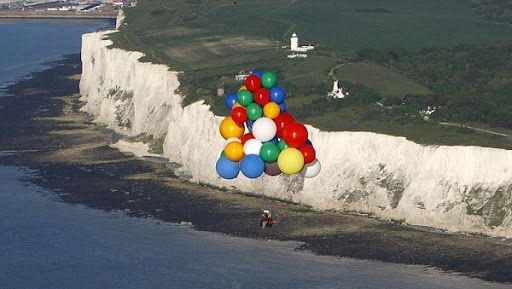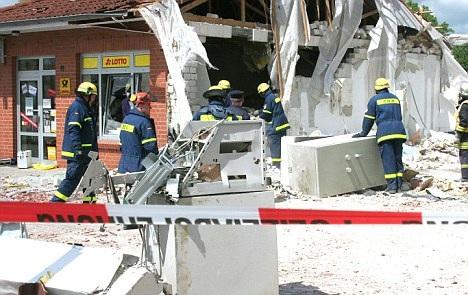This
Memorial Day, we'll be remembering veterans past and present; those still with us, and those who've died. I'd like to suggest that we take the time to think about another sort of veteran . . . those civilians who've been caught up in war, often taken unawares, or targeted for no good reason. They're perhaps the ultimate victims of war, in that they had no way to defend themselves against the violence directed at them.
There have been many, many examples of such victims throughout history. It's false to say that only in the 20th century were civilians regarded as a legitimate military target. They've been massacred for millennia. To mention just a few examples:
- The entire population of Carthage, which was starved to death, or indiscriminately massacred, or sold into slavery, when Rome destroyed the city in 146 BC during the Third Punic War.
- The Mongol conquests led by Genghis Khan (c. 1162 - c. 1227) and his successors, which spread across Asia and the Middle East into Europe and caused the death of at least tens (perhaps hundreds) of thousands of civilians in cities which resisted the invaders.
- The extermination of the Cathars during the Albigensian Crusade (1209-1229 AD), during which Arnaud, a Cistercian abbott and commander of one of the crusading forces, gave his notorious order, "Kill them all - God will recognize his own".
- The widespread massacre of civilians during the Thirty Years' War in Europe (1618-1648). No-one knows how many were killed, or died of starvation or disease or privation after being forced from their homes, but it's estimated that the number is well into the hundreds of thousands, perhaps millions.
- Between a quarter of a million and one million Hindus and Muslims (the exact figure will never be known) were massacred by members of the opposite religion during the partition of British India into the nations of India and Pakistan in 1947. In an attempt to stop the bloodshed, Mahatma Gandhi embarked on a hunger strike, which was partially successful; but he was assassinated by a fanatical Hindu extremist, becoming one of the last victims of the partition.
Many of these victims were unknown to most in the so-called 'civilized' world; they died unheralded, unmourned. They still do. Let me tell you about one such incident that happened rather more recently.
A village in an African nation was tucked out of the way in the bush. There were probably a hundred or more people living there - no-one knows for sure. The inhabitants wanted only to tend their crops and herds, eking out a subsistence existence in the harsh terrain of Africa. Unfortunately, their country became one of the many battlegrounds of the Cold War. The Soviet Union and its surrogates trained and equipped guerrilla movements, and in response the United States and its allies did the same. These movements fought one another in bloody conflicts across the face of that nation.
The village was visited one day by representatives of a pro-Western guerrilla movement. They paraded the residents, forced them to listen to hours of propaganda, stole food and other supplies they needed, and 'conscripted' several of the young men to join their ranks as porters for the stolen supplies. Those selected had no choice in the matter, of course; it was obey, or die. They duly trekked off into the bush with their new masters.
A week or so later, troops from another guerrilla movement arrived. This was a pro-Communist movement, now ruling the country (with substantial assistance from Soviet surrogate forces) after the withdrawal of the former colonial power. They were enraged to find that the villagers had 'given supplies' and 'provided recruits' to their enemy (even though both had been taken at the point of a gun). They decided to punish the entire village.
The result was an atrocity of the grossest kind. Many of the villagers - particularly the men - were shot out of hand, or beaten to death. The women and children must have wished for such a fate before they died. They were raped, beaten and abused. After over 24 hours of this treatment, the government troops took the survivors - mostly women and children - and impaled them on sharpened stakes, set into the thorn
boma rigged up as a perimeter fence around the village. They drove off, leaving their still-living victims to die, perched in the extremity of agony atop the sticks driven deep into their entrails.
An Army patrol from another nation arrived at the village a day later. They wouldn't normally have gone there, but they'd seen the smoke of burning huts the day before, and cautiously came to investigate. They were in the area because their country had become involved in the conflict, supporting pro-Western forces (as did the United States, during those years). The patrol was aghast beyond speech at what they found. Those villagers still alive were hanging on their stakes, moaning, crying out, begging for help. All around them lay the bodies of those fortunate enough to have been killed before they could be impaled. Women, adolescents, even small children wriggled, screamed and begged for mercy atop their stakes. Right next to them, the vultures and jackals feasted on the dead - even, sometimes, on those still alive, who were too weak to defend themselves.
The patrol was helpless. They had only basic first-aid-type medications available; the nearest hospital was hundreds of miles away; there were no ambulances or other vehicles to take the injured there; and even if there had been, how does one remove a stake driven up through the rectum and anus into someone's bowels and internal organs? How could anything be done without causing such unspeakable agony that it would torture the victim beyond endurance? And even if one managed to do so, how could the victim then be moved? They had no anesthetics to numb the pain of being bounced around in the back of a truck, or antibiotics to control the infections that had already set in.
There was only one gift that patrol could give the suffering victims . . . and they gave it. Shots rang out, one by one, as those impaled on the stakes were given the final mercy of a swift, painless death. This was no atrocity - it was the kindest, the
only, thing that could be done under the circumstances. Strong men wept bitterly as they struggled against their emotions, lined up their sights on a woman or child, and pulled the trigger. When the last victim was still and silent, they gathered up the bodies, deepened an existing hollow in the ground, and buried them. One of the patrol read from a dirty, worn, pocket-size New Testament and intoned a brief prayer over the grave as the others stood around silently.
They never knew the names of a single one of those they buried. They left behind them a heap of earth, surmounted by a roughly-fastened wooden cross, in the midst of the burned thatch huts of the village. Nature would ensure that within a year or two, all traces of the village would have disappeared. The bush would take over again. The cross would be eaten by termites before long, and the earth would flatten out over time. In two or three years it would become just another low mound in the African bush, with no hint as to what lay beneath it. Today, it's doubtless long forgotten by everyone except the members of that patrol - and, perhaps (if any survived the civil war in that country), those few youths who were conscripted to carry the stolen supplies, at the start of this whole affair.
(Those who committed this atrocity aren't in a position to speak of their actions. That patrol, by common consent, suffered a 'communications breakdown' for a few days - just long enough to track the perpetrators, hunt them down, and deal with them. There were no survivors. When they got back to base, superior officers were quietly, verbally, informed of what had transpired, and all concerned agreed to let matters lie. After all, what would be achieved by anything else? No-one would care. This was just another village, in just another conflict in Africa - and life's always been very, very cheap in most of Africa. It still is, to this day.)
Remember those nameless villagers this Memorial Day, won't you? Remember the millions who suffered and died in the
Gulag . . . the two million dead in the
Cambodian genocide . . . the eight hundred thousand victims in
Rwanda. Someone should remember them, and say a prayer for their souls. If you and I won't do it, who else is there to remember the forgotten ones?
Say a prayer, too, for the members of the patrol that found the village. They've never forgotten. How can they? The memory haunts their nightmares.
Peter

























